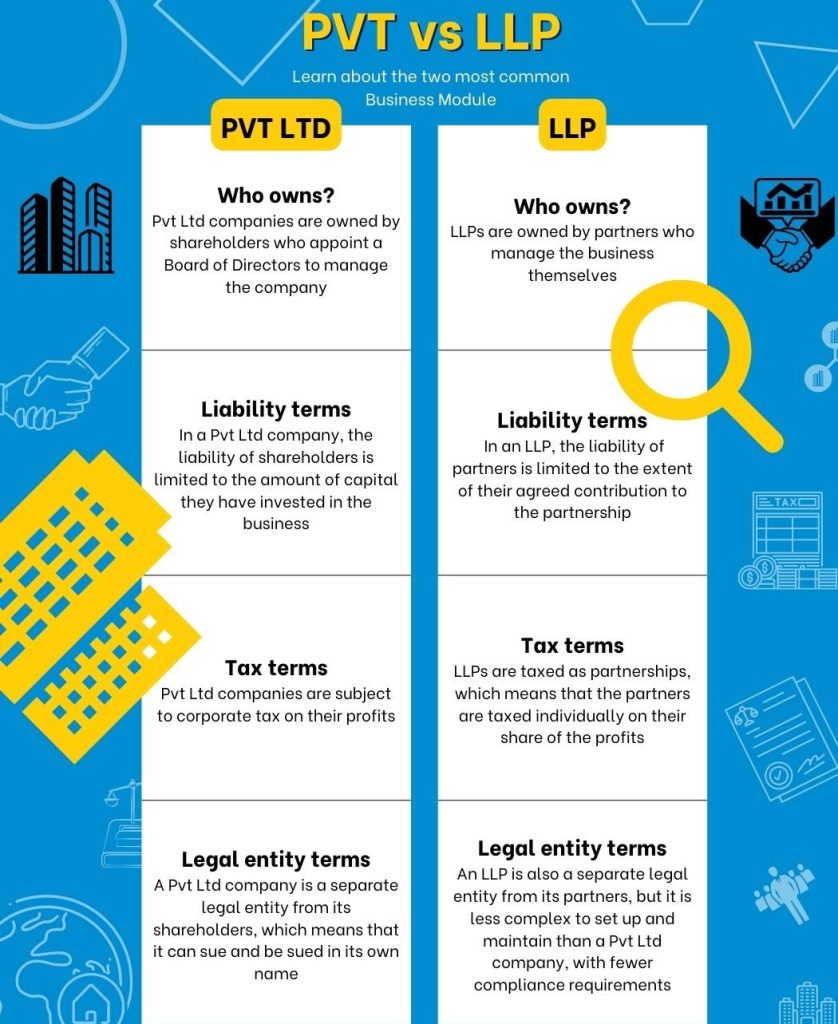![]()
Introduction
Choosing the appropriate business structure is essential for the success of a startup in India. Limited Liability Partnerships (LLPs) and Private Limited Companies are two common company formats . While both provide a certain amount of limited liability insurance, there are important distinctions between the two. The creation requirements, management structure, liability, compliance, taxation, methods for obtaining capital, and other aspects of Private Limited Companies and LLPs in India will all be compared and contrasted in this comparison. Entrepreneurs and investors may make well-informed choices that fit their requirements and goals for their businesses by being aware of the essential characteristics of each company structure.
Key Takeaways
- The decision between LLPs and Private Limited Companies will rely on the particular demands and requirements of the company. Both have advantages and drawbacks.
- An LLP has partners who own and run the company, whereas a private limited company has shareholders who own the company outright.
- A Private Limited Company is a separate legal entity from its shareholders, and the shareholders’ responsibility is restricted to their ownership of shares. An LLP, on the other hand, is a type of partnership where the partners are only partially liable for the debts and liabilities of the company.
- Taxation: Although a Private Limited Company is liable to a higher tax rate, there are additional exclusions and deductions available to it. Because an LLP is taxed similarly to a partnership, earnings are only subject to partner-level taxation, saving the taxpayer money.
- Compliance Requirements: Compared to an LLP, a Private Limited Company has greater compliance requirements, such as yearly filings and required audits.
- Conversion to Other Business Structures: An LLP can be transformed into either a Private Limited Company or a Public Limited Company, whereas a Private Limited Company can be turned into a Public Limited Company quite readily.
- When deciding between a Private Limited Company and an LLP in India, it is crucial to take these differences into account and assess the particular demands and requirements of the company.
Definition and Overview of Private Limited Company and LLP
Private Limited Company: In India, a private limited company is a form of corporate organization whose liability is restricted to the amount of share capital that its investors have contributed. This indicates that, aside from their investment, stockholders are not individually responsible for the company’s obligations. A Private Limited Company is a separate legal entity from its owners and is registered under the Companies Act of 2013. It must be formed with a minimum of two directors and two shareholders and a maximum of 200 stockholders.
Limited Liability Partnership: LLP combines the advantages of a partnership with the limited liability protection of a company. LLPs are a form of business structure used in India. According to the Limited Liability Partnership Act of 2008, an LLP must be registered and is a distinct legal entity from its partners. To create, there must be a minimum of two selected partners who are in charge of running the company. The amount of each partner’s contribution to the partnership is the extent of their obligation. An LLP can have an infinite number of partners, unlike a Private Limited Company, which is unable to issue shares.
Purpose of Comparison
To help entrepreneurs and investors better understand these two widely used company forms in India, Private Limited Companies and LLPs are compared. People may choose the structure that best fits their requirements, ambitions, and future plans for their businesses by contrasting the characteristics, benefits, and drawbacks of LLPs and Private Limited Companies.
Also, the comparison enables people to comprehend the prerequisites for each structure in terms of formation, administration, compliance, responsibility, and taxation. This information can help company owners and investors see the benefits and drawbacks of each structure and select the one that is best for their enterprise.
The comparison’s overall goal is to give people a thorough and understandable understanding of Private Limited Companies and LLPs in India, enabling them to make educated decisions that will have a long-term influence on the success of their enterprises.
Setting up a Business in India: Private Limited vs LLP
A Private Limited Company and an LLP are two prominent company forms to take into account while establishing a firm in India. The decision between the two structures relies on the particular demands and requirements of the company and each has benefits and drawbacks of its own.
A Private Limited Company is controlled by its shareholders, and each shareholder’s responsibility is only as great as the amount of shares they possess. This structure offers more chances to generate money and has a better reputation in the marketplace. Nonetheless, it is subject to a higher tax rate and has more stringent compliance obligations, such as required audits and yearly reports.
The owners and managers of an LLP, on the other hand, are partners, and they are only partially liable for the debts and liabilities of the company. It saves taxes since it is taxed as a partnership and has less compliance requirements. Yet, it might not be appropriate for companies with complicated ownership arrangements or those that demand substantial expenditures.
The size of the firm, the nature of the business, the ownership structure, the investment requirements, the tax consequences, and the compliance requirements should all be taken into account when deciding between a Private Limited Company and an LLP. To weigh the possibilities and make an educated choice, it is advised to obtain professional guidance from authorities in the area, such as Kanakkupillai.
At Kanakkupillai, their team of professionals can assist you in selecting the best company structure for your enterprise and offer a variety of services to help you set up and manage your enterprise successfully. To support companies in thriving in India’s cutthroat market, they provide company registration, accounting, tax compliance, and more.
Incorporating a Private Limited or LLP in India
In order to guarantee legal compliance, there are a number of procedures that must be performed while incorporating a Private Limited Company or an LLP incorporation in India. Below is a summary of the procedures needed to form a Private Limited Company or an LLP in India:
- Get a Digital Signature Certificate (DSC) for the proposed directors or partners of the company. Obtaining a Digital Signature Certificate (DSC) for the proposed directors or partners of the company is the first stage in establishing a Private Limited Company or an LLP. To submit the online application for incorporation, a DSC is necessary.
- Apply for a Director Identification Number (DIN) for the Proposed Directors of the Private Limited Company or LLP: After obtaining the DSC, the next step is to apply for a Director Identification Number (DIN). The Ministry of Corporate Affairs has assigned a special identification number, or DIN (MCA).
- Name Approval: The next step after getting the DSC and DIN is to submit an application for the planned companies or LLP’s name approval. The name must adhere to the MCA’s naming standards and cannot be confusingly similar to any LLP or business that already exists.
- Drafting of Documents: When the name has been approved, the next stage is to draft the LLP Agreement or the Memorandum of Association and Articles of Organization for a Private Limited Company.
- Filing of Forms:The following action is to submit the incorporation forms to the Registrar of Companies (ROC). The MoA, AoA, or LLP agreement, as appropriate, as well as the SPICe (for Private Limited Company) or FiLLiP (for LLP) documents are needed for incorporation.
- Obtain Certificate of Incorporation: The ROC will provide a Certificate of Incorporation for the Private Limited Company or LLP once the forms have been submitted and approved.
- Get a Permanent Account Number (PAN) and Tax Account Number (TAN): After obtaining the Certificate of Incorporation, the next step is to apply for a PAN and TAN for the newly established business or LLP.
In conclusion, there are a number of stages involved in forming a Private Limited Company or an LLP in India, and it is crucial to carefully follow them to guarantee legal compliance. It is advised to get expert advice from a recognized company, like Kanakkupillai, to guarantee a simple and straightforward incorporation procedure.
Cost comparison: Private Limited vs LLP in India.
It’s crucial to take into account many aspects while comparing the cost of a private limited company registration and an LLP in India, including registration fees, compliance charges, and continuing expenditures. The breakdown of the two cost comparisons is as follows:
- Registration Fees: In general, it costs more to form a private limited company than an LLP. A private limited company must pay between INR 8,000 and INR 10,000 in registration expenses, but an LLP must pay between INR 5,000 and INR 7,000.
- Compliance Costs: Because a private limited company is subject to more regulations than an LLP, its compliance costs may be greater. An yearly audit, for instance, is necessary for a Private Limited Business and might cost anywhere between INR 15,000 and 25,000. Nevertheless, until its annual sales or capital contribution exceeds INR 25 lakhs or INR 40 lakhs, an LLP is not required to undertake an audit.
- Ongoing Expenses: A Private Limited Company’s and an LLP’s continuing expenditures are based on the size and kind of the company. Nevertheless, a Private Limited Company often has greater continuing costs since it must comply with more regulations, such as yearly filings and the upkeep of statutory registers.
As a result of cheaper registration fees and compliance costs, an LLP is often more affordable in India as compared to a Private Limited Company. The decision between the two will rely on the particular demands and requirements of the organization, therefore it’s crucial to take into account more than simply the cost when choosing between them. To weigh the possibilities and make a wise choice, it is advised to speak with a qualified counselor like Kanakkupillai.
Differences Between Private Limited Company and LLP
1) Ownership Structure:
The term “ownership structure” describes how a corporation is owned and run, including how ownership is divided among various people or organizations.
- Private Limited Company: A Private Limited Company may have up to 200 shareholders, and ownership is symbolized by shares.
- LLP: An LLP allows for an infinite number of partners and ownership is expressed by partnership interests.
2) Legal Status and Liability:
Businesses in India have a choice between the legal structures known as Private Limited and LLP. When deciding which structure to use, it is crucial to understand the legal status and liability implications of each one.
- Private Limited Company (PLC): A PLC is regarded as a distinct legal entity from its owners. Each shareholder’s liability is capped at the value of their share capital.
- LLP: An LLP is a partnership with restricted liability rather than a distinct legal entity. Each partner’s liability is capped at the amount of their investment in the partnership.
3) Taxation:
Private limited companies and limited liability partnerships have quite different taxation systems in India.
- Private Limited Company: Taxes on dividend distribution and corporate income are both applicable to Private Limited Businesses.
- LLP: Partners in LLPs are taxed on their portion of the income as they would be in a partnership.
4) Compliance Requirements:
For Private Limited Companies and LLPs in India include various legal and regulatory obligations that must be fulfilled by the business entities to operate legally and avoid penalties.
- Private Limited Company: Private Limited Companies are expected to keep a variety of statutory documents and to follow a number of rules, including submitting annual reports and having board meetings.
- LLPs must keep statutory registers, have partner meetings, and submit yearly reports.
5) Conversion to Other Business Structures:
In India, LLPs and Private Limited Companies both have the ability to change their legal forms in response to changing business requirements.
- Private Limited Company: An LLP may be created from a Private Limited Company.
- LLP: A Limited Liability Partnership can become a Private Limited Company.
Although both LLPs and Private Limited Companies provide limited liability protection, there are important distinctions between them in terms of ownership structure, legal status, taxes, compliance requirements, and conversion options. Entrepreneurs and investors must thus carefully weigh the benefits and drawbacks of each structure before deciding which is best for their company.
Advantages and Disadvantages of Private Limited Company
Due to their numerous advantages, Private Limited Companies are a common company form in India and are favored by investors and entrepreneurs. But, there are disadvantages to take into account, just as with every business structure. We will examine the benefits and drawbacks of a Private Limited Company in this article so that company owners and investors can decide for themselves whether this corporate structure is the best fit for their requirements.
Advantages
A business form called a private limited company has a variety of advantages for business owners and investors. It is a popular option for people wishing to establish a business in India because of these advantages. The advantages of a Private Limited Company, such as restricted liability, perpetual succession, greater access to capital, credibility, and tax advantages, will be discussed in this section. Knowing these advantages will assist business owners and investors in determining if a Private Limited Company is the best option for their needs as a company.
- Limited Liability: Shareholders are only held liable for the amount they invested in the company. The company’s debts and liabilities are not their personal responsibility.
- Perpetual Succession: The corporation has a distinct legal identity and may endure changes in its board of directors and shareholders.
- Greater Access to Funding: Angel investors, venture capitalists, and banks can provide equity or debt funding to private limited companies.
- Credibility: As compared to other company formats, a Private Limited Company enjoys greater credibility and goodwill with investors, clients, and suppliers.
- Tax Benefits: The business is entitled to a number of tax breaks and exemptions, including deductions for loan interest payments, asset depreciation, and costs related to research and development.
Disadvantages
While a Private Limited Company has numerous benefits, there are a few disadvantages to take into account. The numerous disadvantages of a Private Limited Company will be discussed in this part, including the need for compliance, restrictions on share transfers, higher start-up expenses, a loss of control, and public disclosure. Entrepreneurs and investors may make an educated choice about whether a Private Limited Company is the best option for their company needs by being aware of these drawbacks and weighing them against any possible advantages of the corporate structure.
- Compliance Requirements: Private Limited Companies must adhere to a number of legal and regulatory obligations, which may be time-consuming and expensive. These duties include submitting yearly reports, maintaining statutory documents, and having meetings.
- Restriction on Transferability of Shares: Shares of a Private Limited Company are restricted from being freely transferred or sold without the consent of the other shareholders or the board of directors.
- More Expensive to Kickstart: Due to the legal and registration fees, Private Limited Companies demand a larger initial investment than other company forms, such as sole proprietorships or partnerships.
- Lack of Control: Shareholders have little influence over how the firm is managed and decisions are made, which can cause disputes and conflicts between shareholders and directors.
- Public Disclosure: Private Limited Companies are required to provide the Registrar of Companies with certain financial and non-financial information that may be seen by the general public and rival businesses.
In conclusion, Private Limited Companies have a number of benefits, including limited liability, funding accessibility, and tax advantages, but they also have some drawbacks, including compliance requirements, limitations on share transferability, higher startup costs, a lack of control, and public disclosure. When selecting to incorporate as a Private Limited Company, investors and company owners must carefully weigh the benefits and drawbacks of each structure in relation to their particular circumstances.
Advantages and Disadvantages of LLP
Advantages
- Limited Liability: An LLP provides its partners with limited responsibility, much like a private limited company does. They are not held personally responsible for the commitments and debts of the company.
- Flexible Ownership Structure: LLPs provide a flexible ownership structure, allowing partners to contribute either cash, talents, or a combination of both.
- Perpetual Succession: An LLP is a separate legal body that exists independently of its partners.
- Tax benefits: LLPs are treated as partnerships, which implies that profits are only taxed at the partner level rather than at the entity level. This may save you a lot of money on taxes.
- Fewer Compliance Requirements: LLP is less expensive to maintain since it has less compliance obligations than a Private Limited Company.
Disadvantages
- Limited Financing Options: Because LLP is unable to issue shares, it has fewer options for raising money through equity financing.
- No Transferability of Ownership: Similar to a Private Limited Company, LLP partners are not permitted to transfer their ownership without the consent of the other partners.
- Lack of Credibility: LLP could not be as credible as a Private Limited Company, which makes it more challenging to draw clients and investors.
- Limited Growth Potential: Because it may be challenging to secure big sums of money through debt financing alone, LLP may not be appropriate for companies with strong growth potential.
- Unlimited Liability of Partners: Partners of an LLP may occasionally be subject to unlimited liability for the wrongdoings or negligence of other partners.
In conclusion, LLP provides a number of benefits—limited liability, flexible ownership structures, perpetual succession, tax advantages, and less compliance requirements—but it also has significant drawbacks, including a lack of credibility, restricted expansion potential, and unlimited responsibility for partners. When selecting to create an LLP, investors and company owners must carefully weigh their goals as well as the benefits and drawbacks of each structure.
Private Limited vs LLP: Which is better?
The particular requirements of the business and its owners will determine whether a Private Limited Company or an LLP is the best option. Before selecting a choice, it is crucial to thoroughly weigh the advantages and disadvantages of both models.
A Private Limited Company could be a superior option if the firm values restricted liability, permanent succession, easier access to capital, and tax advantages. An LLP, however, could be a better option if a flexible ownership structure, lower compliance requirements, and tax savings are the main considerations.
It is crucial to take into account the nature of the company and its potential for expansion. A Private Limited Company could be a preferable choice if the company has a high potential for development and needs a lot of money to expand since it permits equity financing. An LLP, on the other hand, can be a better option if the company is smaller and has fewer capital needs.
In conclusion, there isn’t a single best option when difference between a Private Limited Company and an LLP. The decision is based on the particular requirements of the company and its owners. To weigh your alternatives and come to a well-informed decision, it is advised that you speak with a qualified advisor.
Which Business Structure to Choose?
Factors to Consider
A number of criteria, including ownership structure, legal status and liability, taxation, compliance needs, conversion choices, and expansion potential, should be taken into account when choosing between a Private Limited Company and an LLP.
It’s also crucial to take into account the tax advantages that come with each structure in India. A Private Limited Company has additional tax exemptions and deductions available to it while being subject to a higher tax rate. Contrarily, an LLP is treated like a partnership, which results in tax savings because earnings are only taxed at the partner level.
The business’s finance needs, growth potential, desired amount of control by the owners, and the nature of the enterprise itself are further considerations.
The unique requirements of the company and its owners should ultimately guide the choice of whether to establish a Private Limited Company or an LLP. To weigh your alternatives and come to a well-informed decision, it is advised that you speak with a qualified advisor.
Comparison of Private Limited Company and LLP Based on Different Business Scenarios

It is crucial to take the particular demands and requirements of the business into account while deciding between a Private Limited Company and an LLP. The two architectures are contrasted using various business situations as follows:
Startup or small Business: An LLP could be a preferable alternative for a startup or small business since it has less stringent compliance requirements, lower formation fees, and fewer formalities. A flexible ownership structure provided by an LLP also makes it simpler to welcome new partners or investors.
A flexible ownership structure provided by an LLP also makes it simpler to welcome new partners or investors.
High-Growth Business: A Private Limited Company can be a preferable choice if the company has a high potential for development and needs a lot of funding. This is due to the fact that a Private Limited Company permits equity financing and the issuing of shares to raise money.
Businesses with Limited Liability Issues: An LLP can be a better option if there aren’t many issues with liability and the owners desire more control. An LLP offers some liability protection while enabling flexible ownership and management arrangements.
Professional Services Business: Because an LLP permits professional independence and has less compliance obligations, it could be a better choice for a professional services business like a law firm or accountancy firm.
Export-Import Business: A Private Limited Company may be a preferable choice if the company engages in export-import operations since it provides easier access to international markets and has a more reputable brand.
In India, the choice between a Private Limited Company and an LLP must take into account the particular needs and demands of the company. The choice is based on a number of variables, including the ownership structure, legal status and liability, taxation, compliance needs, conversion alternatives, and expansion potential. Both structures offer advantages and disadvantages.
The tax advantages that come with each form in India are a crucial consideration when deciding between a Private Limited Company and an LLP, as was previously stated. Although a Private Limited Company is liable to a higher tax rate, there are additional exclusions and deductions available. Contrarily, an LLP is treated like a partnership, which results in tax savings because earnings are only taxed at the partner level.
Also, the type of business may influence whether to choose an LLP or a Private Limited Company. A professional services company, for instance, may profit more from an LLP form since it promotes professional independence and has less regulatory obligations. A private limited company form, on the other hand, may be more advantageous for an export-import firm since it makes it simpler to reach international markets and has a better-established reputation.
In conclusion, comparison between an LLP and a Private Limited Company in India necessitates careful consideration of a number of variables. It is advised to get the advice of a qualified adviser to weigh your alternatives and help you decide based on your company’s unique demands and requirements.
Recap of Differences Between Private Limited Company and LLP
The primary distinctions between an LLP and a Private Limited Company in India are summarized as follows:
- An LLP has partners who own and run the company, whereas a private limited company has shareholders who own the company outright.
- A Private Limited Company is a separate legal entity from its shareholders, and the shareholders’ responsibility is restricted to their ownership of shares. An LLP, on the other hand, is a type of partnership where the partners are only partially liable for the debts and liabilities of the company.
- Taxation: Although a Private Limited Company is liable to a higher tax rate, there are additional exclusions and deductions available to it. Because an LLP is taxed similarly to a partnership, earnings are only subject to partner-level taxation, saving the taxpayer money.
- Compliance Requirements: Compared to an LLP, a Private Limited Company has greater compliance requirements, such as yearly filings and required audits.
- Conversion to Other Business Structures: An LLP can be transformed into either a Private Limited Company or a Public Limited Company, whereas a Private Limited Company can be turned into a Public Limited Company quite readily.
When deciding between a Private Limited Company and an LLP in India, it is crucial to take these differences into account and assess the particular demands and requirements of the company.
In conclusion, selecting the appropriate business structure is essential for the development and expansion of any company. The decision between LLPs and Private Limited Companies will rely on the particular demands and requirements of the company. Both have advantages and drawbacks.
To weigh your alternatives and come to an educated decision, it is strongly advised that you obtain professional counsel from subject-matter authorities. A team of knowledgeable experts at Kanakkupillai, a reputable service provider in India, will assist you in selecting the best company structure for your enterprise. They have a proven track record of offering superior service and assistance to companies in a range of sectors.
The professionals at Kanakkupillai are aware of how important your company is to you and work hard to suit your specific demands with tailored solutions. To assist businesses in thriving in a cutthroat market, they provide a variety of services, including business registration, accounting, tax compliance, and more.
In conclusion, Kanakkupillai is your best option if you’re seeking for a dependable service provider to guide you in selecting the ideal corporate structure for your company. Their professionals are devoted to offering trustworthy and efficient solutions to support the success of your company since they recognize that this is your business that is being discussed.







